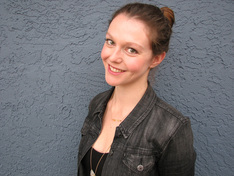 Being rich in smart writer friends, and interested in how the brain creates stories, I had the idea of starting a series asking some of them about how their work was shaped. Chelsea Rooney is the inaugural Storybrain! The author of Pedal, a brilliant and powerful debut novel (Caitlin Press), which was a finalist for the 2015 Amazon.ca Award and a 49th Shelf Book of the Year, Chelsea hosts a monthly episode of The Storytelling Show on Vancouver Co-Op Radio. I love talking with Chelsea as much as I love reading her stuff. She is just as smart in life as she is on the page. Read more at chelsearooney.com. 1. Did you have any alternate titles for your book? What made you pick Pedal, and where did it come from? Alternate titles are funny to recall, because they so clearly mirror certain stages of my research. The first, sly, Wicked Little Girls followed by the angrier Fuck Trauma. I settled on Pedal for its movement and verve. The word has momentum. The novel is short and moves quickly. The narrative spans just several weeks, with plenty of flashbacks filling the cracks. I also liked how “pedal” echoed a main theme, pedophilia. 2. How did you start this book--an image, a word, a general idea? In 2009 I tried riding my bicycle from Vancouver to Nova Scotia. I was twenty-five years old and a mess: fresh out of a five-year relationship, my mother newly diagnosed with early-onset dementia. I was biking home to be with her. The trip was difficult, but one moment of joy stands out. A sunny morning in Banff, Alberta. Riding along the Bow River, teal with glacial silt. And beside the river in a field, a herd of deer, running with us as we rode. My cycling partner, a happy Swiss man, whooped with joy and shouted at them, “Come on, girls!” and for a while it seemed as though they were listening to him. It felt magic, like the reason I'd made the trip in the first place. An iteration of that scene appears in Pedal, and it was the first scene I wrote. 3. How did you find the sense of an ending--did you know when to finish? Did the ending remain the same through different drafts? I'd always had the last scene clear in my mind, but I had no idea how I would get there. It came quicker than I thought, and I was taken by surprise one morning in the coffee shop (April 27th 2012). What a strange and wonderful feeling, closing up the laptop, walking out into the world, having just finished the first draft of my first novel. 4. Could you choose a symbol to represent your book? A shape, person, piece of music, anything you like? It would have to be the bicycle. It’s the perfect machine. Aside from the earthly materials extracted to construct it, it has no harmful effects on the environment and only positive ones on its rider. You can leave it for days, months, years, and return to it easily. There’s a reason they say, “It’s just like riding a bike.” You can abandon a bicycle, but a bicycle will never abandon you. This kind of faith was the same sort it took to write Pedal. 5. You've been clear about your novel's autobiographical basis. Did writing it change your view of the past? Did the fictional transformations you made affect your view? Ironically. I started writing Pedal to prove that the experiences I’d had as a child—experiences I’d hesitated to call “abuse”—had no negative impact on me…Insert endless laughs forever here. It wasn’t until I handed Pedal off to readers (thesis advisors, agents, publishers, editors) and heard their readings of it that I began to see my experiences—and their impact—objectively. My certainty was replaced with bewilderment, a state that shaped my rewrites, and a state I now infinitely prefer.
0 Comments
Leave a Reply. |
ALIX HAWLEYI'm the author of My Name is a Knife, All True Not a Lie In It, and The Old Familiar. Archives
February 2021
Categories |
 RSS Feed
RSS Feed
